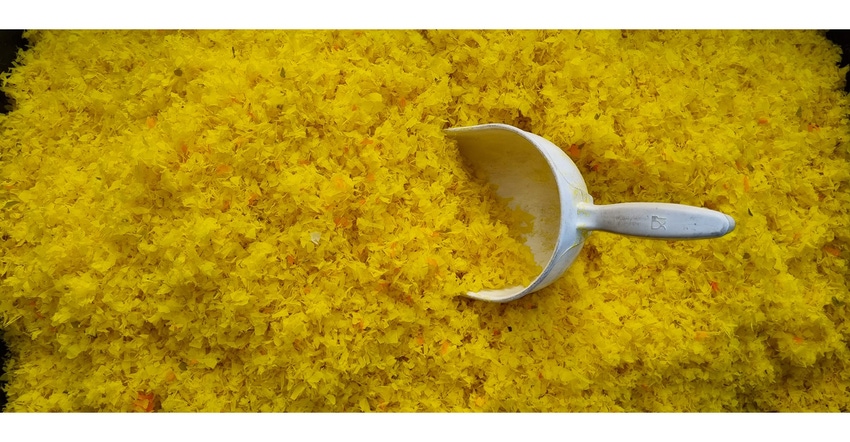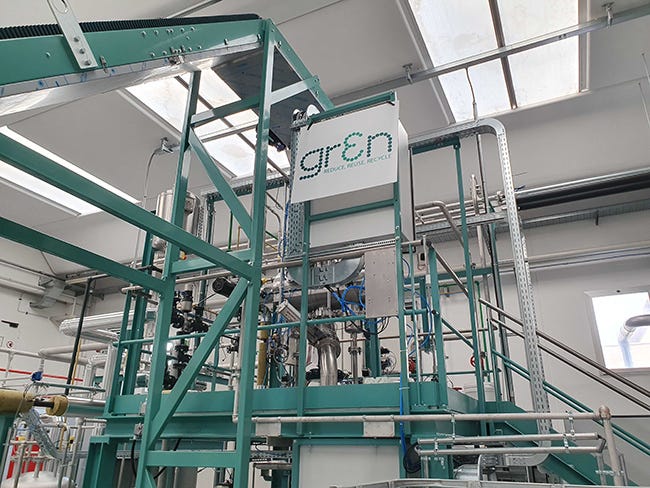Novel PET Recycling Technology Put to the Test
Switzerland-based gr3n signs MOU with Intecsa Industrial to build microwave-assisted depolymerization facility.
July 26, 2023

Switzerland-based gr3n, which has developed an advanced recycling technology for polyethylene terephthalate (PET), reports that it has signed a memorandum of understanding (MOU) with shareholder Intecsa Industrial to build a “first-of-its-kind" recycling facility. The engineering, procurement, and construction (EPC) phase is set to begin in the fourth quarter of 2024 and the plant is projected to be operational by 2027.
Economically viable technology
Gr3n’s advanced recycling process leverages microwave technology and alkaline hydrolysis, providing an economically viable industrial approach to PET recycling, according to the company. The process reportedly breaks down any type of PET and polyester into two core components — PTA and MEG monomers — which can then be re-assembled to obtain virgin-like plastics and achieve endless circularity. The process has the potential to change how PET is recycled worldwide, with huge benefits both for the recycling industry and the entire polyester value chain, said gr3n.
|
Gr3n's Microwave-Assisted Depolymerization technology reportedly saves nearly two million tons of CO2 during its operating life. |
The MOU with Intecsa Industrial, an international engineering contractor based in Spain, will allow gr3n to show that its Microwave-Assisted Depolymerization (MADE) technology is, indeed, market ready, according to Maurizio Crippa, gr3n founder and CEO. “Shareholders have the full view on gr3n’s operations, so moving forward with one of them is further confirmation of their trust but also of the strength of the data and the results generated,” said Crippa.
About 40,000 tons of PET flakes produced annually
The world's first industrial-scale MADE PET recycling plant will have the capability to process post-industrial and post-consumer PET waste, including hard-to-recycle materials, and produce approximately 40,000 tons of virgin PET flakes from the recycled monomers, saving nearly two million tons of CO2 during its operating life, said gr3n. The polyester can come from colored, colorless, transparent, or opaque bottles as well as textiles, which can be 100% polyester or blends containing up to 30% of other materials, including polyurethane, cotton, polyether, and polyurea.
Polymers recycled via MADE technology can be used to produce new bottles and trays or garments with the same functionality as products made from virgin resins, according to gr3n, potentially achieving a circular bottle-to-textile, textile-to-textile, or even textile-to-bottle system.
Accelerating transition to circular economy
“Gr3n has the potential to change the recycling industry, as its technology allows us to tackle things other technologies cannot,” said Ramiro Prieto, commercial and new business units director at Intecsa Industrial. “This means expanding the raw material that can be recycled, then accelerating the transition to the circular economy. As an industrial partner and shareholder, we are part of the board but we have also had the opportunity to perform the basic engineering of the industrial plant. We are well acquainted with the technology, which we firmly believe is now ready to level up.”
About the Author(s)
You May Also Like





